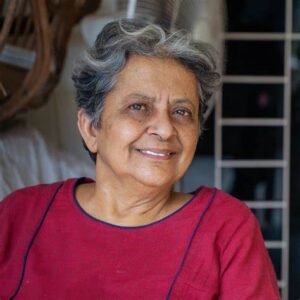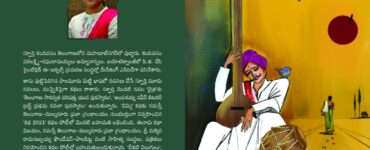SouthSide Books is a new English imprint of Hyderabad Book Trust (HBT), and is dedicated exclusively to publishing material relating to and emanating out of the Telugu/Dakhni speaking states, including from Urdu. They aim to publish literature from the other southern states of India too in future. This is probably the first English language imprint by a publishing house to focus on literature coming from a particular linguistic region. English has become the primary reading language for exponentially growing numbers of people in the Telugu/Dakhni speaking world. We now have the unusual situation where readers, especially younger people, are interested in good literature, both fiction and non-fiction, pertaining to their region, culture, and politics, but are unable to read fluently in their mother tongues. SouthSide Books aims to cater to this readership. What follows is a brief email q&a about SouthSide books with Gita Ramaswamy and Sashi Kumar of Southside Books. Gita Ramaswamy is an author and translator, and a founder of Hyderabad Book Trust. Sashi Kumar is a social activist based in Hyderabad.
Q: We know why SouthSide Books started, but who are the people behind it?
A: The Hyderabad Book Trust and its backers, who include a large fraternity of Telugu writers, have supported us to the hilt. Our working team at present consists of Syamasundari, activist, M. Sashi Kumar, social activist and Suneha who has newly joined us after her post-graduation at IFLU, Hyderabad. Besides this, editors from different parts of India have offered us some service free of charge.
Q: The first few books are out now. I know it is too early, but how has the response been so far? How do you get feedback from your readers?
A: I am always cautious and think that it is difficult to be categorical till about fifteen days. As of now, the response has been very good – many of the WhatsApp messages that have gone out have resulted in people ordering the books. Shops in the two Telugu states who had earlier told us that they cannot implement the cash-and-carry mode that we intend to operate for English books, are now ordering books!
I should add that the feedback to the idea of SouthSide Books itself has been tremendously encouraging. We are getting evidence in support of our hypothesis that there is an underserved regional market for English material.
Q: The books seem to be available only from your website as of now. What is your general plan on reaching a wider English reading audience across India and perhaps internationally too?
A: This is a big challenge undoubtedly, but we think we can meet it. The books are available from Amazon and Flipkart too. We have written to academics and activists in different areas from across India and abroad and have received a good response from them too. HBT has always shipped orders abroad (anywhere in the world on IndiaPost at very reasonable rates) and we will continue to do so. While the books are available online pan-India, it is true that we do not have the kind of promotion that big publishers have. For that, we hope to rely on partnerships with like-minded organisations elsewhere and alternative fora.
Q: Will there be ebooks at some point?
A: Oh yes, certainly. We are uploading on google books and after six months, will upload the kindle version too. We are waiting because we don’t want to see it on unauthorised platforms right now.
Q: In your opinion, what are the hurdles for a new venture like SouthSide Books that focuses on literature from a specific linguistic region in terms of reaching out to a broader readership?
A: Managing sales through book-shops at a national level is a serious issue – and at present the only way out is to tie up with the big distributors/publishers who have the infrastructure in place. The drawback however is that the rates they charge – 60-62%, are prohibitive and make it next to unviable for us. We think that the way out is to enter into agreements with smaller regional publishers with similar aims and objectives. We could offer them a similar service as we have a robust distribution network in Andhra Pradesh and Telangana.
Q: Did you consider partnering with existing English publishers instead of having another English publishing house? What are some advantages of starting on your own?
A: Who will partner with us? The Delhi hegemonists? Uptil now, we have translated, edited, proof-read, even page-set – and handed over the entire work to English publishers, receiving a copy or two in return. A bhasha publisher is as low down in the hierarchy as the colony in the empire. We do have plans to co-publish with like-minded small publishers working in other languages. One book is already being discussed with one such publisher.
Q: How do you choose what you publish? Can writers and/or translators approach you directly with proposals? What is your publishing process like?
A: Well, all of us read a lot. Our friends also do. Writers and translators can and do approach us directly and we expect this to exponentially increase as the first books are out and there is some confidence that this is no fly-by-night operation. Any suitable manuscript is reviewed by three anonymous people, followed by discussions and then the decision.
Q: How do you find translators?
A: We already have a panel of translators and you’d be surprised at the number of people who are interested in translating from Telugu to English as a labour of love. The problem is that the quality of translations is not uniformly good. Good English editors who are familiar with Telugu and the nuances of culture are harder to come by.
Q: While browsing through the website, I got an impression that the upcoming English books that are not translations are all primarily non-fiction. Do you also consider fiction written in English, but focused on life and issues related to Telugu/Dakhni speaking regions?
A: Oh yes, we very much look forward to fiction written in English. I suspect that there are hidden gems of manuscripts tucked away in many a drawer by people who have approached an English language publisher and been daunted by the you-scratch-my-back-I-scratch-yours network.
Q: We see a bunch of upcoming books on the website. If there is only one book you would recommend to us at this point, what would that be? It need not be only from one of the books that are already out in the market. Let us consider the books that will come in the first year or two.
A: That really is an unfair question – it’s like asking a parent which of their children they prefer over the others – that being said, there are a number of books we think are outstanding: a contemporary history reader; a panoramic multigenerational novel; a tribal anthology and so on.
Q: What other Indian publishers would you recommend for English readers interested in reading literature from non-English Indian languages?
A: Translation is quite the rage now that Tombs of Sand has won the Booker. Every major publishing house is bringing out translations now, though some are poor selections and badly edited. OUP and MacMillan (both with Mini Krishnan at one time) really pioneered translation work.
*









Good English editors who are familiar with Telugu and the nuances of culture are harder to come by. This is the main issue. As Gita rightly pointed out there are hidden gems of manuscripts tucked away in many a drawer. Let’s hope SouthSide bring out at least a few of them.
Looking forward to more translations from Telugu and wishing SouthSide Books all the best…